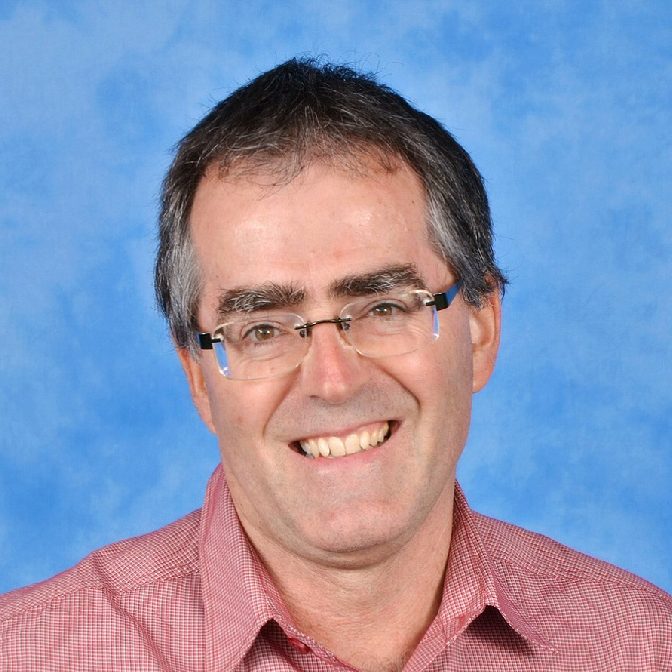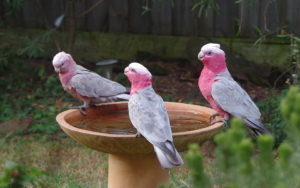Russell Armstrong is dying to talk

Russell Armstrong has spent the past nine years as a spiritual care worker with Barwon Health in Geelong, Victoria, initially within oncology and then in palliative care. Talking about dying is a ‘bread and butter’ matter for him.
Here, he answers questions from the Dying to Talk Discussion Starter. For support in discussing your end-of-life wishes with your loved ones, download it from www.dyingtotalk.org.au
If you had a condition that you could not recover from, what would be important to you, towards the end of your life?
Much of my professional life as a spiritual care worker within palliative care is helping others to process the unwelcome reality of facing their dying, and ultimately trying to make peace with that. Years ago I would never have imagined myself feeling comfortable in such a space, and yet now that I’m in the role it feels like a natural fit. I trust I would be able to do for myself and my family what I have tried to do for others, and make peace with my passing. I hope to look back with a sense of satisfaction and gratitude, to look forward with a sense of hope, and to find peace in the present.
If my dying was to occur sooner rather than later, I expect that for both me and for my family it would inevitably be sad. But I trust that it might be bearably sad, not unbearably sad, with a measured dose of celebration. I hope that in the end my family would look back and say that my death was sad, but also beautiful, because I believe that the two can co-exist.
Are there any pets that you would like to see or be with you, if this is possible?
The three-legged member of our family, our Brittany spaniel named Kellie (a bit of a story re the missing leg) would no doubt excitedly invite herself into my room at the start of each day, but she typically bores quite quickly and makes her departure. However, she likes to sleep close by at night (right outside our window) and always hangs around my feet when anxious, so maybe she would sense something was happening and stay closer by day as well.
Would you prefer a quiet environment or do you prefer activity and chatter around you?
I enjoy what I call Goldilocks days - not too hot, not too cold, but just right. I suspect I would appreciate a Goldilocks measure of sound and activity, not too loud, not too quiet, but just right, with a bit of variety along the way.
Would you like music to be playing and if so, what style or what music?
I’ve always enjoyed listening to music. The Beatles have provided much of the soundtrack to my life, so I see no reason why they wouldn’t also help provide the soundtrack to my dying.
The soothing voice of Norah Jones has helped me sleep through quite a few overnight train and plane trips, and I suspect I might also invite her to help soothe me as I prepare for life’s ultimate sleep.
At the other end of the musical spectrum, when I’m really peed-off with politics (as is often the case) the music of Midnight Oil has been an outlet for expressing that, and I suspect might be turned to when I was feeling grumpy about my situation and in no mood to go quietly into the dying night.
I’m not usually much of a fan for choral music, but I have shared Deep Peace by Bill Douglas with many patients I’ve supported, describing it as something of a ‘musical massage for the soul’. I suspect I might appreciate such a massage myself. And my family already know that I would like Louis Armstrong’s Wonderful World played at my funeral as a counterpoint to any sense of sadness and suffering, and I would probably want to give him a few practice runs before the main event.
If possible would it be important to you to have time outside?
At work I have my ‘God tree’ – a beautiful lemon-scented gum in the grounds of Barwon Health’s McKellar Centre – that I turn to when I feel overwhelmed by the sadness and suffering around me, just to remind me there is still a beautiful world out there. I have no equivalent tree at home but I love our simple garden, and would want to continue to enjoy and tend that as an act of co-creation for as long as I could.
A bird bath in our backyard – visible from several rooms – has provided hours of down-to-earth entertainment as we’ve watched the passing parade of feathered visitors, especially when some of our more colourful native birds grace us with their presence. I’d like to position my bed so they were still within view. An open door or window would be a bonus: the excited trills of our small flock of New Holland Honeyeaters splashing together at the bath several times a day is an aural delight.

Would you prefer to be surrounded by lots of family and friends, or would you prefer one or two closest people to be with you?
If Introverts Anonymous existed I’d probably be a card-carrying member, so I wouldn’t want my dying space to be crowded, but I love my family and have a few special friends whose presence would mean a lot to me.
My lovely wife Lucy and I have slept side by side for more than 34 years, and I would certainly want her to remain as close to her as possible for as long as possible – physically, emotionally and spiritually. I wanted to add about keeping her close sexually as well, as I believe that it is an unhelpfully false assumption that declining health negates our sexuality, but Lucy said she didn’t think I should write that in a public document. Oops, I’ve just gone and done it; sorry sweetie.
Are there any cultural or religious practices you would like to observe?
My Christian faith has been an important part of my life; it’s part of the reason why I think I can make peace with dying when the time comes. I have a fairly liberal faith, with at least as many questions as I have answers. I am quietly confident there is something beyond death that I need not fear, and which may even be beautiful.
I believe in a transcendent God, but also an incarnate God powerfully present through the love and care of human beings. That’s what I have tried to express in my professional role as spiritual care worker, even when, as is most typically the case, God is not explicitly named.
I personally sense that I am rarely closer to God than when I’m sitting with a dying person: the nature of time seems to change. My spirit can feel deeply connected with someone I might have only recently met. Conversation focuses on things that really matter. Truly, we are on sacred ground.
All of that, I guess, is an expression of my hope that God would feel deeply present as I prepared for my dying. I would like the simple symbol of hope, light and comfort offered by a candle. I would like a blessing offered for me and my family at the time of my crossing into the beyond, just as I have offered for others, in words and in touch. I would like to hear the words that I have offered so many times to others, words which so often bring a tear to their eyes and a lump to my throat, words which I have borrowed with a few simple changes from Lutheran pastor Aub Podlich.
May the feet of God walk with you, and his hand hold you tight;
may the eye of God rest on you, and her ear hear your cry;
may the smile of God be for you, and his breath bring you life;
may the peace of God grow in you, and her love bring you home.
Is there anything else you can think of that you would like?
I don’t cope well with dumb politics, with people who should know better stuffing up the planet and practicing economics that perpetuates injustice and inequality. I suspect if time was starting to run short I might decide to reduce stress by giving up on the evening news. Sorry SBS/ABC: I would probably still appreciate your company at a few other times in the week.
What is on your bucket list of things you would like to do or achieve before you die?
Lucy and I have often reflected on how content and blessed we feel with our lives, so if I was told I was to die next week I think I could live with that and not feel too ripped off. That said, there is still plenty that I would like to see and do.
I’ve enjoyed tracing my family history in considerable depth, and have visited many of the places in Australia connected with my ancestral past. The next and long anticipated step is a trip to explore my roots in the UK, and I would certainly like to make that happen; roll on 2018 and long service leave! I would also like to welcome grandchildren into our family, but I feel no urge to put that pressure on our kids.
There is some writing I’ve tinkered with concerning both my family history and my fascination with trains, so it would be nice to see a couple of those projects reach fruition.
Having helped dozens of palliative care patients create a legacy document for their family through the beautiful process of dignity therapy, I would want to do the same for myself and my family. Thankfully we have a fantastic team of volunteers at Barwon Health who assist with that process, so I would be truly spoilt for choice when it came to asking for help!
Actually, I just remembered, I can’t die peacefully next week. Apart from the long service leave, my daughter and son-in-law said that they are getting me tickets to Midnight Oil for Father’s Day, so I better add that to the bucket list and at least make it to November!
How did you feel during the process of completing this form? Was there anything about the process that interested or surprised you?
I think it’s the nature of my professional role, and not just the fact that I’m naturally morbid, but I have often thought about my dying. When I conduct training for our palliative care staff and volunteers, I often start with a short exercise that invites them to think about their dying, with the assumption that we need to be prepared to wrestle with the same sorts of issues that the people we care for are wrestling with if we are to be genuinely present and of emotional help to them.
Reflecting upon these questions has been a nice thing to do. I have been misty eyed a few times, there has been an occasional lump in my throat, but I’ve also smiled a lot, even laughed once or twice, and Lucy has too.
Life and death are inextricably linked. Honestly facing the reality of dying can thus go hand in hand with appreciating the wonderful gift of life. So it’s not just that “talking about dying won’t kill you”; it might foster new insights and attitudes and so bring a genuine gift into your life!
